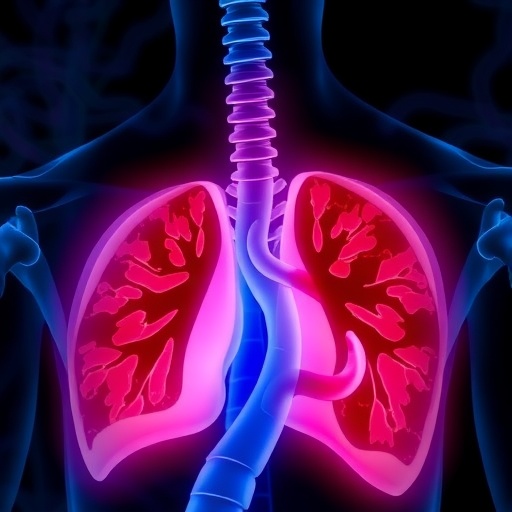In an era where aging populations are becoming the norm, understanding the complex interrelationships between various health conditions has never been more pressing. Recent research delves into the intertwined nature of stress hyperglycemia, community-acquired pneumonia, and delirium in older adults. Authored by a team of experts led by Liao, this study investigates the crucial connections between these factors, revealing insights that could transform clinical practices and improve patient outcomes in geriatric medicine.
Stress hyperglycemia refers to the phenomenon where elevated blood glucose levels occur in response to acute medical conditions, leading to potential complications and poorer health outcomes. It is particularly noteworthy in older adults, a demographic already vulnerable to metabolic and functional disturbances. This study zeroes in on how stress hyperglycemia can trigger or exacerbate delirium among older patients hospitalized with community-acquired pneumonia, an ailment that affects a substantial portion of the elderly population globally.
Delirium, characterized by altered mental status, confusion, and fluctuating levels of consciousness, can drastically impact recovery trajectories in older patients. It not only prolongs hospitalization but also leads to increased mortality and diminished quality of life. The interplay between hyperglycemia – a common response to stress – and delirium is gaining attention as a critical area of exploration in geriatric health. Liao and colleagues’ work highlights the need for timely identification and intervention strategies to mitigate these adverse effects.
The study analyzed a cohort of elderly patients diagnosed with community-acquired pneumonia, scrutinizing their blood glucose levels upon admission. The researchers noted a significant correlation between elevated blood glucose levels and the incidence of delirium. This relationship underscores the importance of monitoring glycemic control, particularly in patients 65 years and older. Remarkably, the data suggested that higher glucose levels could precede and forecast episodes of delirium, putting a spotlight on blood sugar management as a potential target for therapeutic interventions.
Interestingly, the researchers also explored the mediating effects of the neutrophil-lymphocyte ratio and procalcitonin levels on the relationship between hyperglycemia and delirium. Neutrophilia—an increase in neutrophils in response to infection—coupled with lymphopenia, can indicate a systemic inflammatory response. In this study, while these inflammatory markers were indeed relevant to disease prognosis and infection severity, the effects of stress hyperglycemia remained direct and potent even when controlling for these variables.
This finding is valuable for healthcare providers as it emphasizes that while inflammation plays a role, managing blood glucose levels may be more crucial to preventing delirium in this patient population. Clinicians often overlook hyperglycemia in non-diabetic patients during acute hospital admissions, but this study gives compelling evidence that paying attention to this aspect can have broader implications for patient care and recovery, particularly in elder patients suffering from acute illnesses.
Challenging traditional views on delirium management, this research advocates for a more holistic and comprehensive approach to patient care—one that encompasses not only the immediate treatment of infections but also the metabolic responses that accompany acute stressors. The necessity for routine screening and proactive management of blood glucose levels is essential, especially in emergency or acute care settings where older patients are frequently admitted.
Healthcare professionals must also consider the long-term repercussions if these acute glycemic events remain unaddressed. Episodes of delirium can have lingering cognitive consequences, leading to reduced functional status and autonomy for elderly patients following hospitalization. Therefore, the implications of this research extend beyond the immediate clinical environment, influencing how aging societies approach healthcare challenges related to significant health events.
Within the aging population, nuanced care strategies that prioritize both acute symptom management and chronic condition monitoring are crucial. Hospitals might develop protocols that not only treat the root causes of conditions like pneumonia but also implement routine glycemic monitoring and interventions. Engaging a multidisciplinary team to address both infectious processes and metabolic responses can enhance patient outcomes, reduce instances of delirium, and potentially lower healthcare costs associated with prolonged hospital stays and rehabilitation.
Ultimately, the study by Liao et al. serves as a clarion call for the integration of metabolic health considerations into the care protocols for older adults facing acute medical conditions. Their findings shed necessary light on an often-overlooked area in geriatric care and advocate for more robust clinical guidelines that prioritize comprehensive assessment and management of blood glucose levels.
As we continue to broaden our horizon in geriatric medicine, such insights fuel the conversation about how to provide optimal care for older adults. Through ongoing research and collaboration among healthcare professionals, we can hope to minimize the challenges posed by delirium, improve health outcomes, and enhance the quality of life for many elderly patients navigating the complexities of disease.
Lastly, the mounting evidence presented in this study lays the groundwork for future inquiries into the intricate relationships between stress responses, metabolic health, and cognitive status in older adults. It highlights the essential need for healthcare systems worldwide to adapt to the changing demographics and unique needs of their aging populations, ensuring that holistic, patient-centered care becomes a standard practice rather than an exception.
By continuing to explore the dynamics between stress hyperglycemia and delirium in aging individuals, we stand to gain not only in medical knowledge but also in the capacity to deliver empathetic, effective, and restorative care tailored to one of society’s most precious yet vulnerable groups.
Subject of Research: The association between stress hyperglycemia and delirium in older adults with community-acquired pneumonia.
Article Title: Direct and indirect associations of stress hyperglycemia with delirium in older adults with community-acquired pneumonia: limited mediation by neutrophil-lymphocyte ratio and procalcitonin.
Article References:
Liao, J., Shen, X., Du, Z. et al. Direct and indirect associations of stress hyperglycemia with delirium in older adults with community-acquired pneumonia: limited mediation by neutrophil-lymphocyte ratio and procalcitonin.
BMC Geriatr 25, 735 (2025). https://doi.org/10.1186/s12877-025-06410-w
Image Credits: AI Generated
DOI: 10.1186/s12877-025-06410-w
Keywords: stress hyperglycemia, delirium, community-acquired pneumonia, older adults, neutrophil-lymphocyte ratio, procalcitonin, geriatric care, metabolic health, cognitive status.




